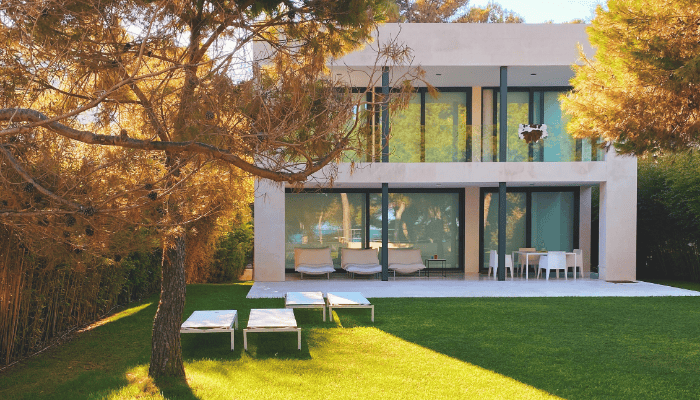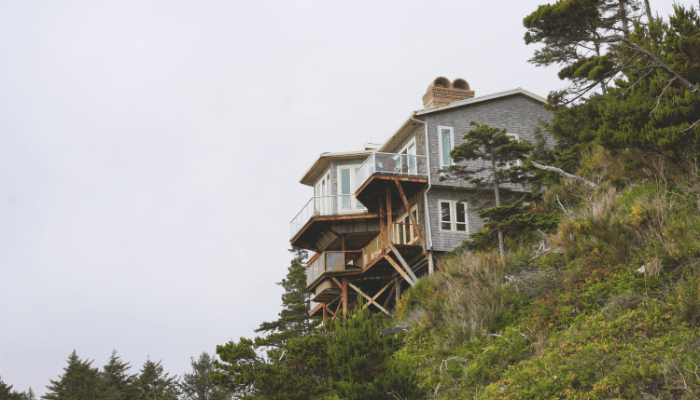Key Takeaways
- A well-maintained inground pool can add 5-8% to home value in the right market.
- Warm climates and luxury neighborhoods see the highest returns.
- Modern design, safety features, and good maintenance are key to buyer appeal.
- Poorly maintained or out-of-place pools can reduce buyer interest.
- Staging, repairs, and upgrades before selling can maximize ROI.

Picture this: you walk into a backyard and see crystal-blue water shimmering under the sun. You can almost feel the splash, hear the laughter, smell the sunscreen. It’s a feature that turns heads instantly. But here’s the question homeowners whisper to themselves. Does it turn into dollars when it’s time to sell?
An inground pool can be a lifestyle upgrade, a neighborhood showstopper, and in some markets, a serious selling point. In others? It’s a costly luxury that buyers see as a liability. The difference between the two isn’t luck. It’s math, market trends, and smart preparation.
Here’s the truth: there’s no one-size-fits-all answer. National averages suggest a well-maintained inground pool can bump your home’s value by 5-8%. But those numbers only tell part of the story. Climate, buyer expectations, and even the condition of your decking can tip the scales in your favor, or against you.
So in this guide, we’re stripping away the vague “it depends” answers and digging into real factors that move the needle. We’ll look at where pools pay off, where they don’t, and what you can do to make yours an asset instead of an obstacle. Because if you’re going to invest tens of thousands of dollars in a hole in the ground filled with water, you should know exactly how to make it pay you back.
Does an Inground Pool Add Value
In some markets, a pool is practically a badge of honor. In others, it’s a financial sinkhole you’ll never swim out of. The truth sits somewhere in the middle.
Nationally, a well-maintained inground pool can increase home value by around 5–8%. In warm climates with long swimming seasons, that number can be higher. But if your pool looks like it came with the house in 1975 and hasn’t been updated since, don’t expect buyers to treat it as an asset.
The takeaway? A pool adds value when it matches what buyers in your area already want, and when it looks like something they can start enjoying the day they move in.
Add Value with a Sustainable Pool Design
The Numbers Behind Pool ROI
Let’s talk numbers. A typical inground pool installation can cost anywhere from €37,000 to over €93,000, depending on size, materials, and features. On resale, you might see €18,500-€46,500 of that investment reflected in your asking price, if the conditions are right.
Why not full value? Because buyers know pools come with ongoing costs: chemicals, electricity, repairs, and insurance. The more efficiently your pool runs (think energy-efficient pumps, solar heating, and modern filtration), the less resistance you’ll get during negotiations.
Factors That Boost Pool Value
Want your pool to be seen as a bonus, not a burden? These are the conditions that tip the scale in your favor:
- Warm Climate Regions: Homes in places like Florida, Arizona, and Southern California attract buyers who expect to swim most of the year.
- High-End Neighborhoods: In luxury markets, pools are part of the baseline for outdoor living.
- Well-Maintained & Modern Design: Updated liners, stylish coping, and new decking make the difference between “dream feature” and “renovation project.”
- Safety Features: Fences, covers, and alarms that meet local codes show buyers you’ve handled the details.

When a Pool Won’t Add Value
Yes, there are situations where a pool can hurt your sale price, or at least your chances of finding the right buyer quickly.
- Short Swimming Seasons: If your pool’s usable for only 2–3 months a year, ROI is harder to justify.
- Neighborhood Mismatch: If surrounding homes don’t have pools, buyers may see it as out of place.
- Overpowering the Yard: A pool that eats up nearly all the outdoor space limits the appeal for families and gardeners.
- Poor Condition: Cracks, outdated equipment, or cloudy water are instant red flags.
Beyond Dollars: Lifestyle Appeal
Here’s the part where spreadsheets can’t measure how a pool makes a home feel. For families, it’s an instant summer plan. For entertainers, it’s the centerpiece of every party. Even for buyers who aren’t daily swimmers, the idea of a private oasis can speed up decision-making.
And speed matters. In hot markets, a pool can make your home stand out in online listings and drive more showings. That competition can sometimes push your sale price higher than you’d expect from ROI calculations alone.
How to Maximize Value Before Selling
If your pool’s going to help you sell, treat it like a showroom.
- Repair & Refresh: Fix cracks, resurface decking, and replace outdated tiles.
- Upgrade Equipment: Energy-efficient pumps, heaters, and LED lighting are big selling points.
- Landscape Smartly: Frame the pool with low-maintenance plants that stay neat year-round.
- Get a Professional Inspection: Share the report with buyers to eliminate uncertainty.
A pool that looks and works like new is easier for buyers to say “yes” to.
Alternatives to an Inground Pool
Not every yard (or budget) can handle a full inground installation. These alternatives can still boost appeal without the same cost:
- Above-Ground Pools: Modern models can look sleek with the right decking.
- Plunge Pools: Smaller, space-saving, and often more energy-efficient.
Swim Spas: Combines fitness and relaxation in a compact footprint.

Local Market Reality Check
A pool’s value isn’t just about the water, it’s about where that water sits. Geography and neighborhood culture can make or break the return on your investment.
- Climate Factor: In places like southern Spain, the south of France, or coastal Portugal, a pool isn’t a luxury, it’s expected. In cooler or rainier regions, it can be a harder sell.
- Neighborhood Norms: If most homes on your street have pools, not having one could make your home less competitive. If few do, yours might stand out in good or bad ways.
- Buyer Demographics: Younger families may love a pool for recreation. Older buyers may see maintenance, not fun.
Action Step: Research local property listings. Compare recent sales of homes with and without pools in your area to see how much of a difference it really makes.
The Psychology of Pool Buyers
Home buying isn’t purely logical, it’s emotional. Buyers aren’t just calculating square metres; they’re picturing birthday parties, lazy weekends, and warm evenings with friends by the water.
- Visual Staging: Crystal-clear water, uncluttered decking, and comfortable seating create an instant connection.
- Lifestyle Cues: Loungers, umbrellas, and subtle lighting make the pool feel like part of a larger living space.
- Photo Strategy: Your listing photos should make the pool irresistible with wide shots, good angles, and showing it as part of the whole backyard experience.

Detailed Cost-to-Value Math
Numbers don’t lie, but they also don’t always tell the full story.
- Average Install Cost: €37,000-€93,000 depending on size, materials, and features.
- Annual Maintenance: €1,100-€1,700 for cleaning, chemicals, and minor repairs.
- Utilities Impact: €280-€750 a year for water and electricity.
- Potential Value Increase: 5-8% of your home’s value if it matches market expectations.
Example: If your home is worth €600,000, a pool could add €30,000-€48,000 in value in the right conditions.
Design & Features That Drive Value
Some pools sell themselves. Others… don’t. The difference is in design, efficiency, and presentation.
- Shape & Depth: Modern, clean-lined designs (especially rectangular pools) appeal to more buyers.
- Energy Efficiency: Solar heaters, variable-speed pumps, LED lights, all reduce running costs and boost appeal.
- Surroundings: Non-slip decking, shaded seating areas, and well-kept landscaping matter.
- Add-Ons: Built-in spa, water features, and shallow tanning ledges increase luxury perception.
The Dealbreaker Checklist
These issues can turn a “wow” into a “no” before the viewing is over:
- Cracks or visible structural damage.
- Outdated or broken filtration systems.
- Murky, uninviting water.
- No safety features in family-oriented areas.
If you’re selling, fix these first. They’re often cheaper to address than the price drop you’ll face if you ignore them.

How to Frame the Pool in Your Marketing
Your pool is more than a box on the features list, it’s a selling story.
- Headline Appeal: “Resort-style garden with heated pool” grabs more attention than “property with pool.”
- Feature List: Mention the size, installation year, upgrades, and energy-efficient systems.
- Buyer Hand-Off: Maintenance records, warranties, and recent service receipts reassure buyers and make your pool feel like a safe investment.
Alternatives to an Inground Pool
If you’re not ready for a full inground installation, or your market doesn’t favor it consider:
- Above-Ground Pools: Modern designs can look elegant when paired with decking.
- Plunge Pools: Smaller, easier to maintain, and stylish in compact gardens.
- Swim Spas: Combine exercise and relaxation with lower running costs.
Conclusion: Does an inground pool add value to your home?
At the end of the day, an inground pool is as much about lifestyle as it is about resale. For the right buyer in the right market, it’s a must-have feature. For the wrong one, it’s a dealbreaker. Your job as a homeowner is to stack the odds in your favor before that “For Sale” sign goes up.
That means making sure the pool is in top condition, compliant with safety standards, and staged like the luxury feature it’s meant to be. It means understanding your local buyer pool, and whether they see swimming laps as leisure or labor.
If your home is in a warm-climate region, in a neighborhood where pools are common, and your design looks modern and low-maintenance, you can expect a healthy return. If not, the value might not come in cash but in years of personal enjoyment. And that’s not nothing.
So before you start pricing tiles and water features, decide why you’re adding it. If it’s purely for ROI, do your homework. If it’s for lifestyle, design it so future buyers see it as an asset too. That’s the sweet spot, when your pool delivers both memories and market appeal.
Thinking of adding a pool that actually adds value? See our custom natural pool designs built to impress buyers and outlast trends. Or reach out to us to discuss a build for a traditional inground pool.



